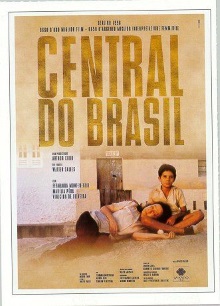
This is an older Brazilian film by Walter Salles and I’ve written about his work before. He directed one of the segments in Paris, je t’aime, one of my favorite ones actually about an immigrant needing to travel far from home to get to work in Paris. He also directed the acclaimed Motorcycle Diaries which my wife watched but which I missed because I wasn’t much interested in films back then. On the other hand, I’ve also watched his Hollywood remake of Dark Water, which is as awful as these adaptations of Japanese horror films generally are. That’s quite a leap in terms of style and quality!
Dora is a retired schoolteacher who now earns money by writing letters for passersby at Rio de Janeiro’s Central Station. In effect, she preys on the hopes and dreams of her customers as she doesn’t take the letters seriously and instead of sending them as she promised, merely keeps them at home or tears them into pieces after making fun of them with her friend. One of her customers is a woman with her young son, Josué, who writes a letter to her husband saying that she hopes to reunite with him. After the mother is killed in a car accident outside the station, Dora feels compelled to do something about Josué who has never met his father. At first she tries to make some quick cash by selling him to a dubious adoption service but wracked by guilt she rescues him and tries to send him on a journey to meet his father as he wishes, even though she doubts that the father is the kind of man Josué’s mother claims he is. As you might expect in a film like this, she ends up accompanying him on his journey across Brazil against her own intentions and eventually bonds with him.
This is a road trip film that ticks all of the right boxes: solid performances, especially by lead actress Fernanda Montenegro, an immersive journey from the hubbub of Rio where life is demonstrably cheap to the grimy interior of the country, and along the way intriguing micro-portraits of the ordinary people who are Dora’s customers. Unfortunately it is also a thoroughly conventional film that tries too hard to be heartwarming, becoming instead sentimental and predictable. A telltale sign of this is the music that is so overt an emotional signpost that you can always tell exactly when the strings are going to swell. If you’re conscious of the film’s efforts to tell you exactly how you should feel at any given moment, you’re actually less inclined to go along with the director’s intentions. This would have been a stronger film with more subtlety and greater ambiguity.
There are bits of Dora’s story that are ripe with potential. For example, I loved the contradictory feelings that she holds for her own father and repeatedly warns Josué not to expect too much for fear that he will be disappointed. Similarly, she holds men who drink in obvious disdain and yet when she sees a chance to attract a man, almost the first thing she does is try to offer him a drink in order to show that she’s okay with it. Unfortunately the film focuses more on the relationship between Dora and Josué than on these darker and more intriguing psychological issues. Together with the lack of any scenes showing Josué mourning over his mother, it’s another indication that this is more of a mainstream film that you’re meant to feel good about than a serious drama. The director just doesn’t want to inflict any more trauma on Josué.
I enjoyed Central Station for what it is and especially appreciated its depiction of rural Brazil. It was great to watch a film starring Montenegro, who is apparently considered one of the country’s finest actresses, and it is never boring to watch talented child actors like Vinícius de Oliveira. But this isn’t quite the masterpiece that I’d hoped it would be.
One thought on “Central Station (1998)”